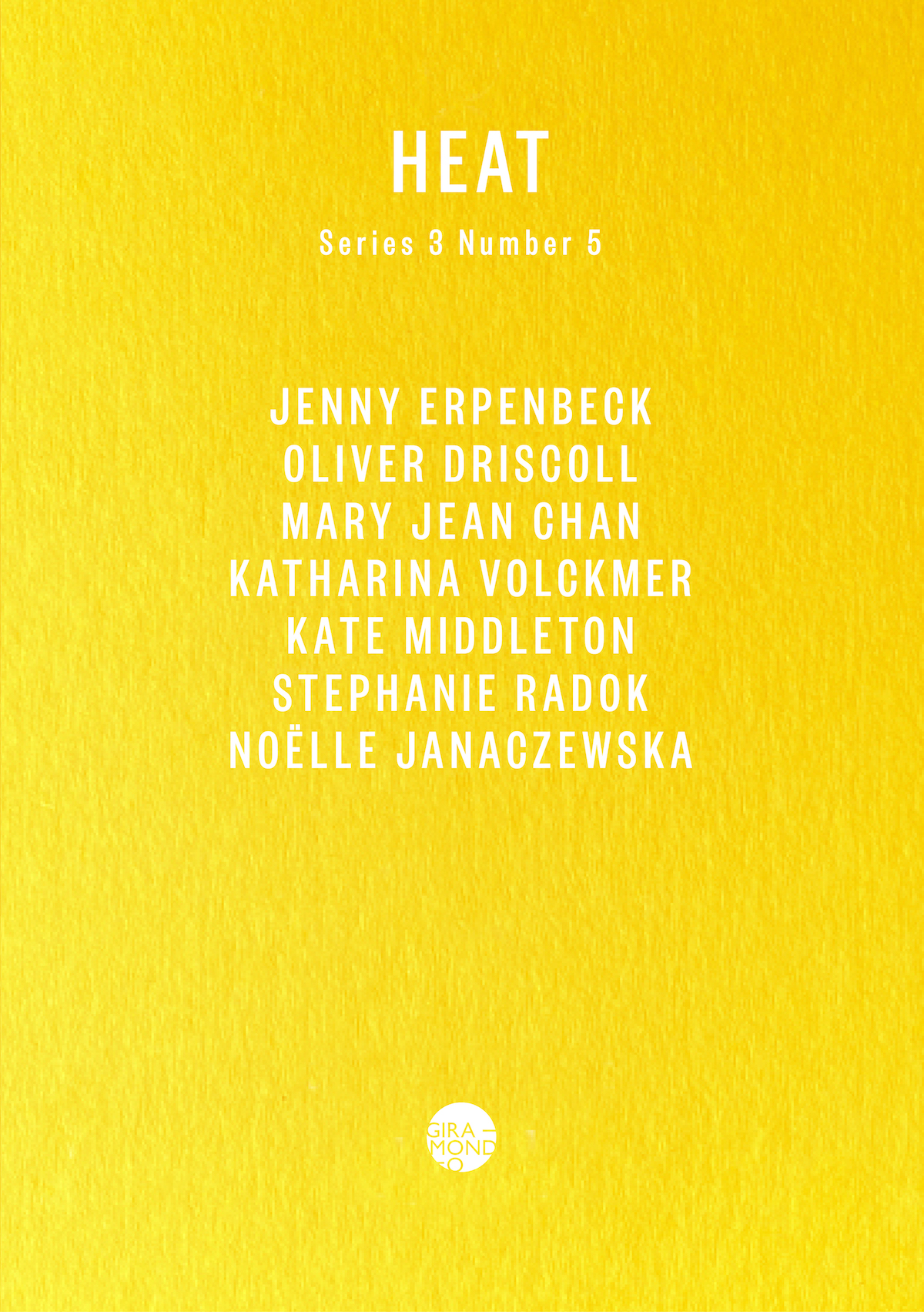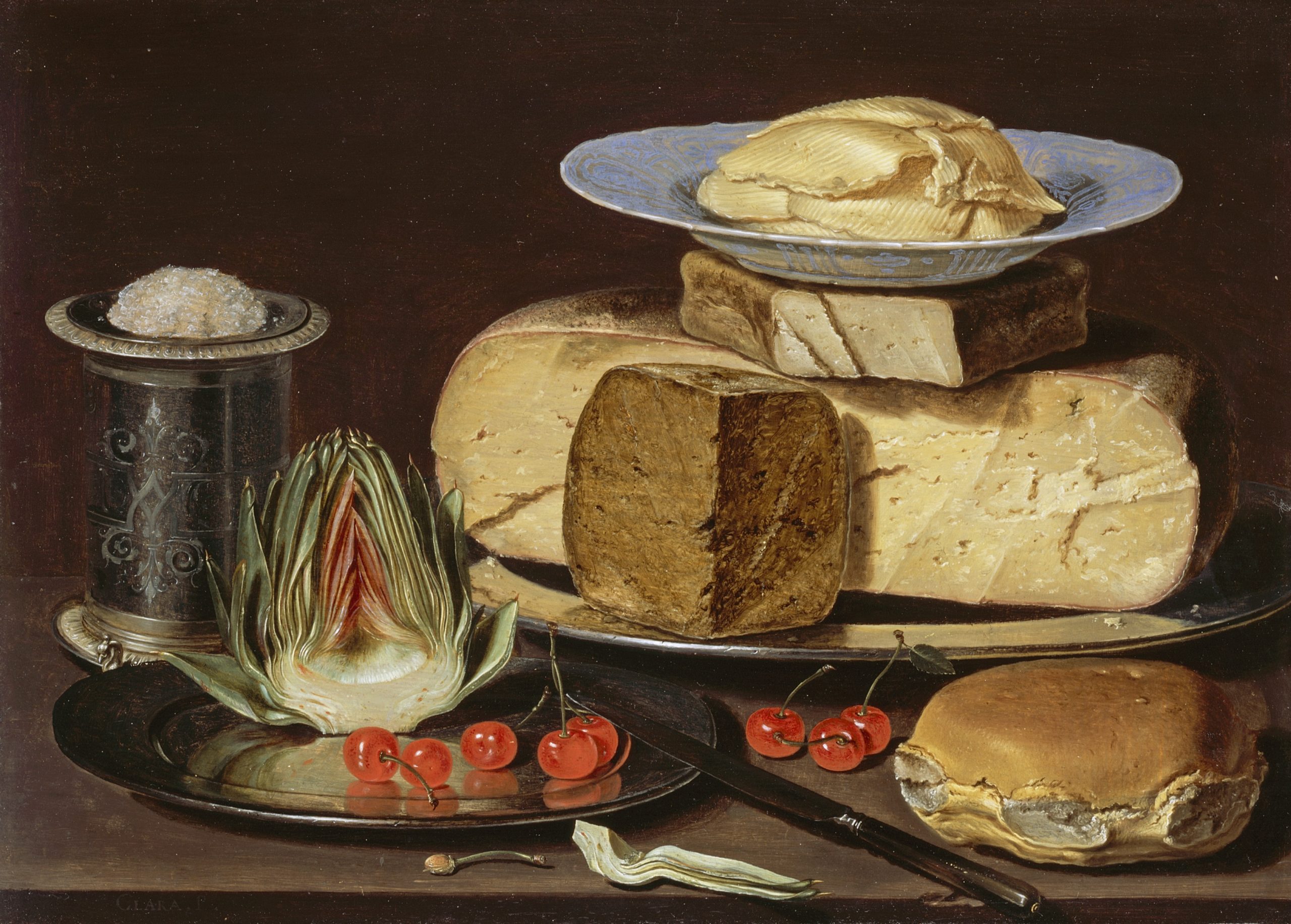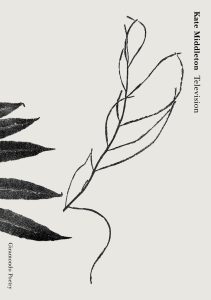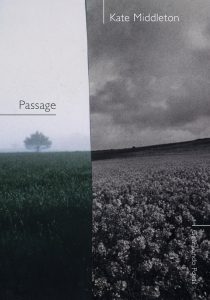Television Poems
I
at last they put the poet on TV, the one they always
had to label: spinster, recluse, or else just too intense:
in her corset and her petticoats, we see her burrowing
to find her own blood, the monthly malady that starts
within, and when she throws herself into the most
dramatic wail, declares her pain in the greatest
ostentation, two taboos arise as once, against which
there is no inoculation: a poet, already a near-fatal
flaw, and, on TV, a wilfully unmarriageable woman:
it thrills me this mess of being, and television can only
push it further, can only make the poet a goth rock star,
saucy, charismatic, living some life I hadn’t known
I’d dreamed of: I never liked The Cosby Show – at least,
I never liked Bill Cosby, which was not prescience, just
a wish to be left alone: of course when I was nine, ten,
eleven, I watched when it was on, and because I was
that age, I felt what Rudy felt: the only episodes
that stay with me these decades on are the ones about
the women, Clair’s crash diet, losing weight to fit
a dress, a past, a disordered dream, or, most, when
Rudy menstruates at last, the last child’s menarche,
and is embarrassed by the fuss: as I watched, I thought
I wanted it, the blood, the fuss, but I was also, myself,
humiliated by Dr Huxtable, his nosing over it, around,
his teasing Rudy, which played as one more dad joke,
not the symptom that I now suppose it was, even then:
when I did bleed, some months later, I found that same
humiliation, the conversation I’d rehearsed, how to tell
my mother I was somehow now more grown, a mush
of words I could not say: instead I tried to hide it: and
when I watch Emily dig up layer upon layer of white
cotton until she confirms the coming mess at last I see it
performed, the real response I feel each time: I was
listening to fans talk about the Liars, remembered
the way dialogue could ring true – You are giving me
cramps – and how audacity could be squelched, again,
with malicious voyeurism: and now, in youth, at least,
on screen, at least, the Amherst poet refuses to be
squelched, converses with the hallucinatory bee,
with Death, dares spectacle and hunger, dares
to strip the many layers back, dares deny at least
a moment that some rule will be laid down upon her
head, and she’ll pay for such audacity with a sanitised
reputation, her words themselves subversive, any
other shape to her life storied into sheer seclusion, or
else those wild nights imagined for a new demographic:
I can only hope they’ll appreciate her ribbons, her
bread, her pencil stubs, her uncompromising wants,
her strong hands, her words, her full disclosure of the blood
II
when the soap star faced accusations…when the sitcom star
faced accusations…when the novelty star faced accusations…
some days it seems like all the reassuring hams of broadcast
have had their masks ripped off: and, yes, when it comes
to reporting the sex crimes of the once-were ‘rich and famous’
it all resembles Scooby Doo more than SVU – at least so long
as tabloids print, reprint, their remorseless voided faces, skate
across the jagged nerves of victims: a facade falls and the portrait
of Dorian Gray looms alarmingly ordinary: we used to watch
Hey Dad..! as a family (my mum liked Nudge) and I was delighted
when I found Walgett on the map: Walgett, a real place, not
a television place: I wanted to go there, like the day years later
we drove my cousins to Bonnie Doon, and they sang, as
you must now, or you must if you’re Anglo, We’re goin’
to Bonnie Doon, because what they wanted was not
the destination, but the journeying toward: my parents
sure that the joke of being from Walgett (this joke somehow
got laughs) was the best thing about Walgett: erasure: TV’s
pathology: we never went: and in suburban Sydney
the sitcom architect turned sinister – hey, ‘dad’, there’s
a real evil in these studio lots: hey, ‘dad’ is a mask too,
worthy of Twin Peaks: Twin Peaks, which is not a real place
name, but the town is real, the diner’s real, the Douglas fir trees,
and Douglas fir tree scent, all real – : the question, ‘Who killed
Laura Palmer?’ posed midway through Hey Dad..!’s
run, but on another channel, the ads for it, the mystery,
lingering a decade before I watched: yet I watched it too,
unknowing: Laura’s trauma played out on Hey Dad..!’s set,
not yet knowing what I saw, a daughter, later recast, now
re-emerging to break nostalgia’s grip, reveal the sickness:
it’s happening again: and when the stories broke, a long
parade of faces – again: reassuring as childhood: broken
as childhood: looking up the history, Walgett’s our hope,
Walgett where waters converge: Hey Dad..! never mentioned,
of course, the Freedom Rides, the protest: that history has nothing
to add to the hapless white single-dad story, so I suppose
we should be grateful that at least Betty was played for laughs
and not for sex appeal: and that Laura Palmer, played for sex, was
at least shown cyanotic, swaddled in death, in plastic, wrapped
in all the damage we’ve endured
III
a cast changeover, not a second string, but mid-career, mid-
life, reshuffle: churn: or the reminder that we all gain
that second chin, or its equivalent, in time: season three,
safe in the realm of historical memory, but episode one
and my mother unsure of this new queen: she tells me
how much she liked Claire Foy, Foy’s radiance, radiance
of Coronation, Annunciation, capturing a sense of something
lost in us by years: then episode two, the switch to Margaret,
scandalous, and episode three it’s coal, collieries, slurry,
the need for stricter regulation, the bodies of how many
children – 116 – buried under the labour we still want
to give a working class, for which we’ll lease new seams,
the labour we still heroise in images as our televisions blaze
out late into the night: then there it is: the vision of the mountain
sliding down itself, engulfing the classroom, engulfing
every notion of innocence, over so quickly yet unforgettable:
I look up the psychological studies, the lasting testimony,
reactions of the surviving children: the Pied Piper brought
the mountain down to them, and yet some escaped the Piper’s
wrath (when the Piper is an earth hollowed out and then refilled,
his wrath is terrible and inexact): the children tell the aftermath,
the wish to disappear, retreat indoors, retreat to silent footsteps,
downcast looks, the sense that existing in view is just
a reminder to the parents of the lost of what is lost:
everything: and yet, carry on, there is a better world
to forge: when I write I’m aware that each phrase,
each opinion, alienates me from half the population,
my politics inescapably detectable – and television helps
to reinforce this rift: we can agree on Foy’s radiance, but not
facts: still, by episode three, we have adjusted to this new vision,
coal a crisis replacing fog, smog: mid-career must be
a rough spot for a monarch too, sheen worn off and image
showing scuffs: and Aberfan, deluge of slurry, of collapsing
mountainside, of landscape inundated with black, blackening
despair: we watch the years tick past, The Crown a moving
image timeline, and the welling tear, the second welling tear,
a moment still, a moment beyond embattlement and politics,
a moment deep in self-doubt and self-reflection: who hasn’t
thought what this queen says at some time: I have known
for some time that there is something wrong with me: some
time, all of the time, there is surely something wrong with each
of us: I have always cried too much, once got sent home
from school for excessive anguish, so surely there is something
wrong with me, to be so swept, ineluctably, into such feeling,
perhaps an early sign of future diagnosis, and the twice-tried
drawdown from the years of medication – lachrymose weeks,
months, and then the doctors stating, well I guess the pills do
something: now Olivia Colman is the New Becky, alongside
an age-lined barrage of New Beckys (Old Beckys only ever
glimpsed in memory, and Becky an Aristotelean recognition
of species through the filtering out of any particulars, arrival at
the essence) while the promise of the next generation comes
into view: meanwhile, Prince Andrew stepping back, this
from television too, disastrous interview, backlash, audience
primed to outrage, scripted into choice of villain, concentrating
discontent, and the pronouncement from the palace never quite
attuned to current feeling, as if such tempering is ever possible:
they, we, learn it all again: there is no commensuration
Notes
I
In Dickinson we see a young, queered, surreal-tinged Emily Dickinson and I love it. The episode of The Cosby Show in which Rudy gets her period is called ‘The Infantry Has Landed (And They’ve Fallen off the Roof)’. All she wanted was for this occasion to pass invisibly, a sentiment that resonated with my own experience. Aria says, ‘You’re giving me cramps’ in the the episode, ‘She’s No Angel’, in season six of Pretty Little Liars’. ‘Wild nights’ refers to not just a Dickinson poem, but also to the movie Wild Nights with Emily, a queer period rom-com telling of Dickinson’s relationship with Sue Huntington Gilbert Dickinson.
II
The trial of Hey Dad..!’s Robert Hughes is just one in a spate of unmasked abuses. Alongside Hey Dad..! this poem references the cartoon Scooby Doo (and arguably echoes the use of the ‘Scooby Doo Ending’ suggested in Wayne’s World), the series Law and Order: SVU, the Oscar Wilde novel The Picture of Dorian Gray, the film The Castle and the David Lynch show Twin Peaks. David Lynch’s Twin Peaks is often cited for its surrealism; however, its too-real contemplation of the abuse hidden by the veneer of suburban life is what stays with me.
III
It’s hard, being Kate Middleton and being uninterested in the royals. Sometimes the royals are thrust upon you. When The Crown started, I didn’t know that I too would fall for it, but I did. And while I enjoy the politics and palace gossip of it, it’s really the environmental episodes that have stayed with me – the London smog in season one, and Aberfan, in season three. The loss of so many children at Aberfan has been the subject of psychological study. ‘New Becky’ refers to the replacement of the original actress playing Becky in the show Roseanne. A friend said, ‘I can’t believe you called Olivia Coleman a New Becky.’ I did.





